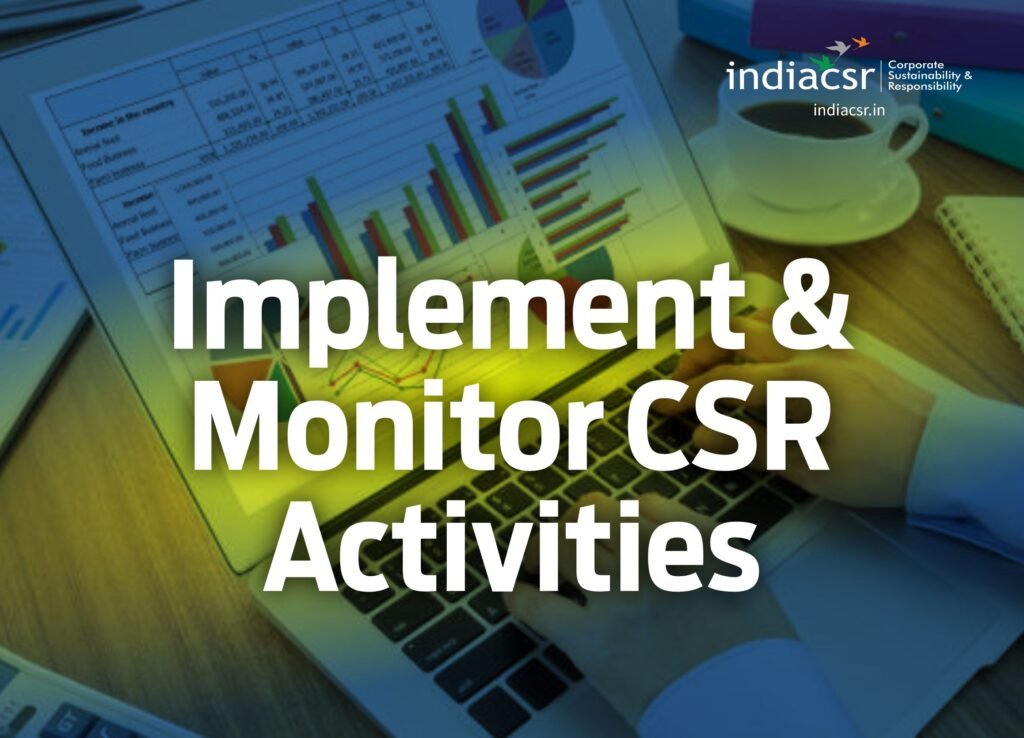Welcome to India CSR Story. In this edition, we will delve into the topic of developing a successful Corporate Social Responsibility (CSR) policy.
CSR is an important aspect of modern business and can be a powerful tool for companies to demonstrate their commitment to being socially responsible and making a positive impact on the world. To help you develop a CSR policy that aligns with your company’s values and goals, we have identified five key steps. So, let’s dive in and learn how to develop a CSR policy that will set your company apart and contribute to a better future for all.
A Corporate Social Responsibility (CSR) policy is a document that outlines a company’s commitment to being socially responsible in its operations and business practices. It includes the company’s values, goals and objectives for addressing social and environmental issues, as well as its plan for implementing and monitoring its CSR activities. The purpose of a Corporate Social Responsibility policy is to integrate social and environmental considerations into a company’s operations and decision-making, and to demonstrate its commitment to being a responsible corporate citizen.
Step -1: Define company’s values and responsibilities

Start by defining your company’s values and the social and environmental responsibilities you want to fulfill through your CSR efforts.
The first step in developing a successful CSR policy is to define your company’s values and the social and environmental responsibilities you want to fulfill through your CSR efforts. This step is crucial as it helps you understand your company’s purpose and the impact you want to make on society and the environment. By defining your company’s values, you can ensure that your Corporate Social Responsibilityefforts align with your company’s mission and purpose. Additionally, by identifying the social and environmental responsibilities you want to fulfill, you can prioritize your CSR efforts and ensure that they have a meaningful impact. This step will help lay the foundation for a strong and effective CSR policy that will benefit your company and the communities you serve.
Step -2: Identify stakeholders
Must Watch: YouTube Story
Determine who your stakeholders are, including employees, customers, suppliers, communities and the environment, and understand their expectations and needs.
The second step in developing a CSR policy is to determine who your stakeholders are and understand their expectations and needs. Stakeholders are individuals or groups who are impacted by your company’s operations and decisions. They include employees, customers, suppliers, communities, and the environment. By understanding the needs and expectations of your stakeholders, you can ensure that your Corporate Social Responsibility policy addresses their concerns and reflects their priorities. This step is important because it helps you create a policy that is relevant and meaningful to the people and communities you serve. It also helps you identify areas where you can have the greatest impact and allocate resources accordingly. By engaging with your stakeholders and understanding their needs, you can build trust and create a positive reputation for your company.
Step -3: Set CSR goals and objectives

Set specific, measurable and achievable CSR goals that align with your company’s values and address the needs of your stakeholders.
The third step in developing a policy is to set specific, measurable and achievable purpose. This step involves setting clear and concise objectives for your CSR efforts that align with your company’s values and address the needs of your stakeholders. The goals should be specific, so that you can clearly define what you hope to achieve and measure your progress. They should also be measurable, so that you can track your progress and assess the impact of your Corporate Social Responsibility – efforts. Finally, the goals should be achievable, so that you can realistically accomplish your objectives within a set timeframe.
Setting specific, measurable, and achievable CSR goals helps you prioritize your Corporate Social Responsibility efforts and focus your resources on areas that are most important to your company and your stakeholders. It also helps you demonstrate the impact of your CSR efforts and communicate your progress to stakeholders. By setting clear and meaningful goals, you can ensure that your policy is effective and contributes to your company’s success.
Step -4: Implement and monitor CSR activities

Develop a plan to implement and monitor your activities, including regular reporting and communication to stakeholders.
The fourth step in developing a policy is to develop a plan to implement and monitor your activities. This step involves creating a roadmap for how you will put your Corporate Social Responsibility goals into action and track your progress over time. The plan should include specific activities and initiatives that you will undertake to achieve your CSR goals, as well as a timeline for when these activities will be carried out. Additionally, the plan should outline how you will monitor and evaluate your efforts to ensure that they are having the desired impact. This step is important because it helps you bring your goals to life and ensures that your efforts are carried out in a systematic and organized manner.
Regular reporting and communication to stakeholders is also an important part of this step. This helps you keep stakeholders informed about your efforts, including what you are doing, why you are doing it, and what the impact has been. This level of transparency and openness helps build trust and demonstrates your commitment to being a responsible corporate citizen. By implementing and monitoring your social development activities, you can ensure that your policy is effective, relevant and meaningful to your stakeholders.
Step -5: Evaluate and revise: CSR Policy

Regularly evaluate your CSR efforts and make necessary revisions to ensure they are effective and aligned with your company’s values and goals.
The final step in developing a policy is to regularly evaluate your efforts and make necessary revisions. This step involves reviewing your activities to determine their impact and effectiveness, and making changes as needed to ensure that your policy remains relevant and aligned with your company’s values and goals. This step is important because it helps you continuously improve your efforts and ensures that they are having the desired impact.
Regular evaluation can involve collecting feedback from stakeholders, measuring the results of your activities, and assessing the effectiveness of your monitoring and reporting processes. Based on this evaluation, you can make revisions to your policy and activities as needed to address any challenges and improve the impact of your CSR efforts. This step helps you keep your document up-to-date and relevant, and ensures that your efforts continue to support your company’s mission and goals. By regularly evaluating and revising your policy, you can ensure that your CSR efforts are effective and contribute to your company’s success.
Note: We hope you enjoyed this story. If so, please consider giving the video a thumbs up, sharing it with your network, and keep reading indiacsr.in for future updates on CSR initiatives and developments. Your support is greatly appreciated. Thank you again for being with us!
(CopyRight@IndiaCSR)























